Manal’s family chose to stay in a shelter in Jabaliya; Nadeem’s mother doesn’t answer texts even when communication is up. Their homes in northern Gaza were destroyed, and they know Israel intends to prevent their return to create a security zone
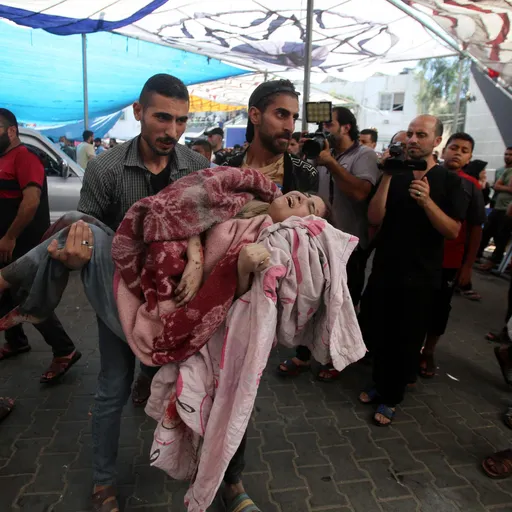
Saturday, November 4, 10:43 A.M. Finally, we get word from my friend Manal. A short Messenger text: They found refuge in an apartment in the Jabaliya refugee camp, she says, with other relatives.
About an hour before our short exchange, a bomb hit the area of Al Fakhura, a large UNRWA school at the edge of the refugee camp, whose classrooms shelter thousands of displaced persons from the northern Gaza Strip. According to initial reports, between 12 and 15 people were killed in the bombing, and several dozen were injured.
Ten or eleven hours earlier a bomb or bombs hit another school, which also became a shelter for thousands of displaced persons.
Al Jazeera English broadcasts the regular post-bombing footage: a commotion on the street as everyone runs around to evacuate the wounded in cars or ambulances; someone, clothes blood-soaked, lies on a stretcher; another – face and body blurred by the editors – lies dead on the ground. A woman shouts at the camera and waves her hands toward the sky.
Every banister of the large, L-shaped building is laden with blankets and clothes, the uprooted families trying to air their belongings. Ten or eleven hours earlier – around midnight on Friday – a bomb or bombs hit another school, which also became a shelter for thousands of displaced persons and was located in a residential neighborhood between Gaza City and Jabaliya. The Osama Bin Zayd School was named after one of Muhammad’s companions. Social networks are full of graphic images of the bodies of the dead, alongside more professional photographs: about 20 bodies, each wrapped in white cloth, lying in two rows on the floor, a woman sitting across the frame dressed in black, saying goodbye to her loved ones.
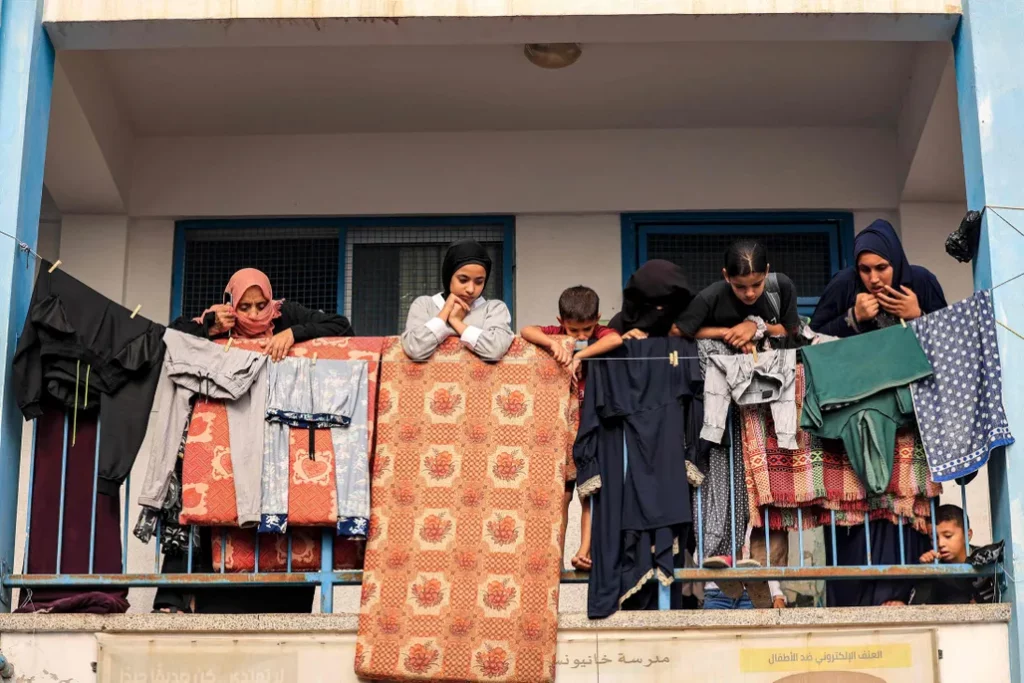
The relief at a long-awaited sign of life from a family member or friend lasts only seconds, immediately replaced with the constant anxiety that a deadly bomb will drop in the next moment, and with the knowledge that their lives are now a never-ending cycle of grief. The apartment of Manal’s family has probably already been destroyed by Israeli bombings and invasions. It had been wrecked twice since 2009. Hers and her husband’s pride has always been the boys they managed to send to medical school abroad, and the little garden they cultivated in the building’s courtyard. Planted and re-planted.
They visited the boys in Europe, and though they could have stayed with them, they always came back to Gaza, to the garden and the apartment. The knowledge haunts our short Messenger exchange: according to statements by Israeli officials, residents of the northern Gaza Strip won’t be permitted to return to their bombed homes, won’t be able to rebuild them for the third or fourth time. The area is intended to become an Israeli security zone. Its refugee residents will become refugees again.
Manal’s voice is flat, but she doesn’t forget to ask me how I am. Why didn’t you go to the south, I ask her. She answers: “Because they’re bombing everywhere anyway. Bombing everyone, including the caravans headed south. There’s no safe place. It’s extermination. Do you know what extermination is?” I hear similar explanations from many others who decided to stay in the northern Gaza Strip, despite the army’s demand – starting October 13 – to move south. Every day, such bombings are reported, killing and wounding civilians.
Indeed, Al Jazeera reported on Satruday afternoon that the army had announced residents of northern Gaza could evacuate south between 1 P.M and 4 P.M. The news channel probably got the information from the IDF Spokesperson’s Arabic Facebook page, posted, just before noon: “To the people of Gaza, I’d like to inform you that the Israeli Defense Forces will allow passage on the Salah a-Din Road today between one and four o’clock in the afternoon. For your own safety, use this time to move south beyond the Gaza Valley. If you care about yourself and your loved ones, go south as directed. Rest asssured that Hamas leaders have already taken care to protect themselves.”
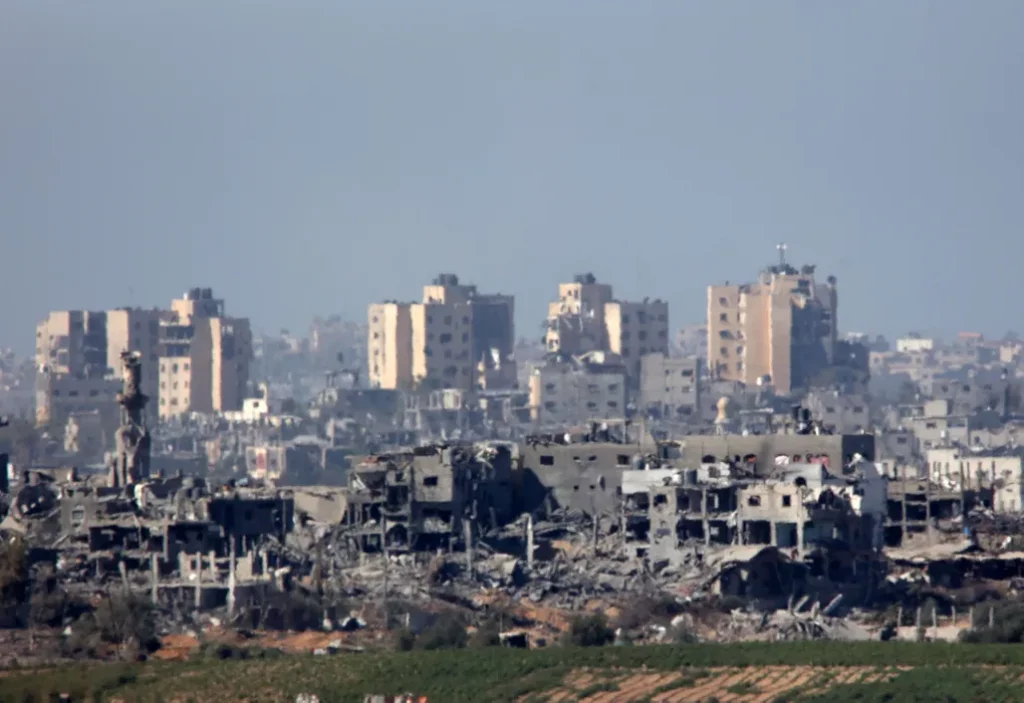
Gazans understood the bombings that preceded the spokesperson’s announcement as a means of persuasion to evacuate the north. Palestinian sources reported that a bomb had landed at the gates of Gaza City’s Al-Nasser Children’s Hospital, shelling its only power source, its solar panels. A senior citizens home in the city, Al-Jazeera reported, also had its renewable energy system damaged in the bombardment; and the bombing hit the area near Gaza’s Indonesian Hospital.
Did the spokesperson’s order/recommendation convince Manal and her family to move further south? So far, there’s no telling: the connection has been severed. Al Jazeera asserted the three-hour window was illogical as planes continue to strike the area one must cross to reach the Salah a-Din main road from towns such as Jabaliya, Beit Lahiya, or the a-Shati refugee camp. Even if the walking or driving route to the main road is not bombed, who will find vehicles or carts to transport 300,000 people, of which 160,000 are in UNRWA facilities, and where will the fuel be found? With no fuel, drivers are once more filling their tanks with cooking oil, as they used to do in 2007 during the most severe siege on the Gaza Strip. But cooking oil will run out, too.
Splitting up as a precaution
Nadeem, the son of my friends, lives abroad. The friends had moved to an UNRWA school in Nuseirat refugee camp during the war’s second week. Last Thursday, after a day had passed without word from them, Nadeem wrote to me: “They’re alive. My uncles are in a school in the a-Shati refugee camp. The school was hit and their son was killed. They were evacuated to another school, where they tried to get a car to Nuseirat, but the roads were blocked. There are no cars and they are too many for one car. We have lost contact with them.”
On October 23, Nadeem’s father sent me a photo of a leaflet that had been dropped a day earlier from an Israeli aircraft: “An urgent warning! To the people of the Gaza Strip. Being north of the Gaza Valley puts your life in danger. Anyone who chooses not to evacuate the northern Gaza Strip to the area south of the Valley may be seen as a member of a terrorist organization.” Since the village of Nuseirat and the refugee camp next to it are south of the Gaza Valley, the army will not consider these friends of mine as members of a terrorist organization: parents in their 50s, their youngest son – a law student who excels at everything he touches from Oud to the computer to math, and two grandmothers who are 1948 refugees. One is paralyzed and blind; the other suffers from lung disease. They should feel safe in the classroom that has become their shelter for the past three weeks.
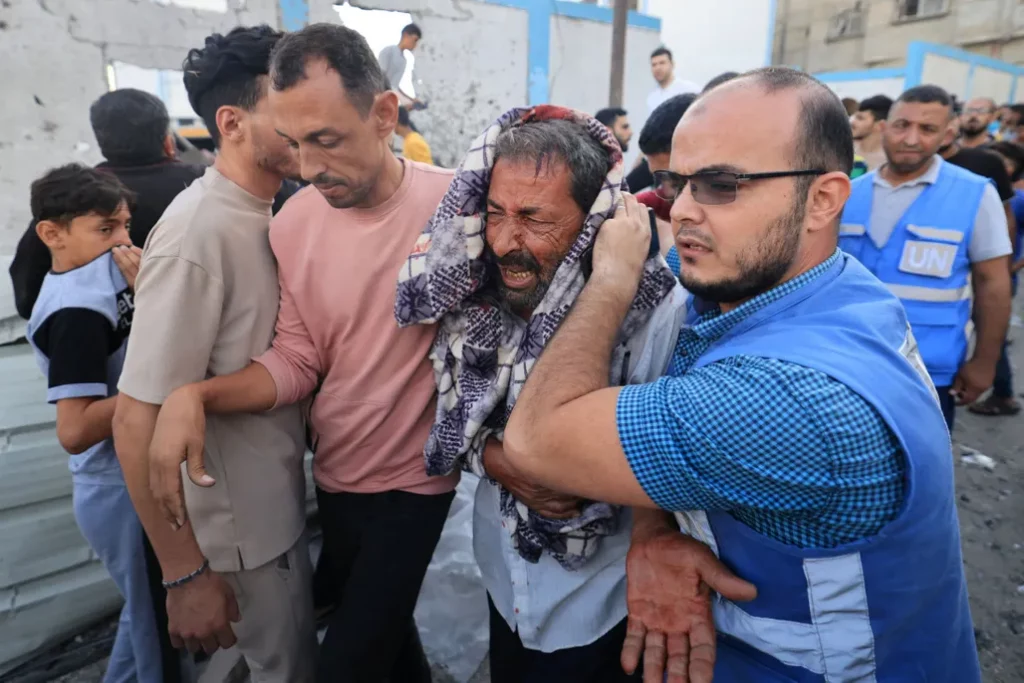
Nadeem’s mother – with her contagious laughter and stories of her work as a teacher and then as a school principal – expresses her opinion of the situation in continuous silence. She doesn’t answer WhatsApp messages even when there’s a signal for a few minutes. The house they built north of the a-Shati camp was bombed along with the rest of the neighborhood, most homeowners in which were refugees who established themselves materially through university studies in the 1980s, talent and hard work.
On the night between Friday and Saturday, the Palestinian news agency Wafa reported, “Occupation planes renewed the bombing of civilians in the Nuseirat and al-Bureij refugee camps.” My friends’ WhatsApp is silent, but I know that Nadeem would have contacted me if the news had been bad. All I can do is imagine the trembling of the blind grandmother, the fear of falling asleep again, the murmuring of prayer, his father’s decision to hide his fears and his mother’s blank stare.
How close was the explosion to them? What are its consequences? If there is anything that shows how different this war is from its predecessors, it is the absence of reports from the two most important human rights organizations in Gaza, Al Mezan and the Palestinian Center for Human Rights. Their courageous field researchers no longer move about, reporting daily on the bombings and the damage they cause, as they did diligently in every previous war and attack – risking their life in a way that seemed calculated at the time.
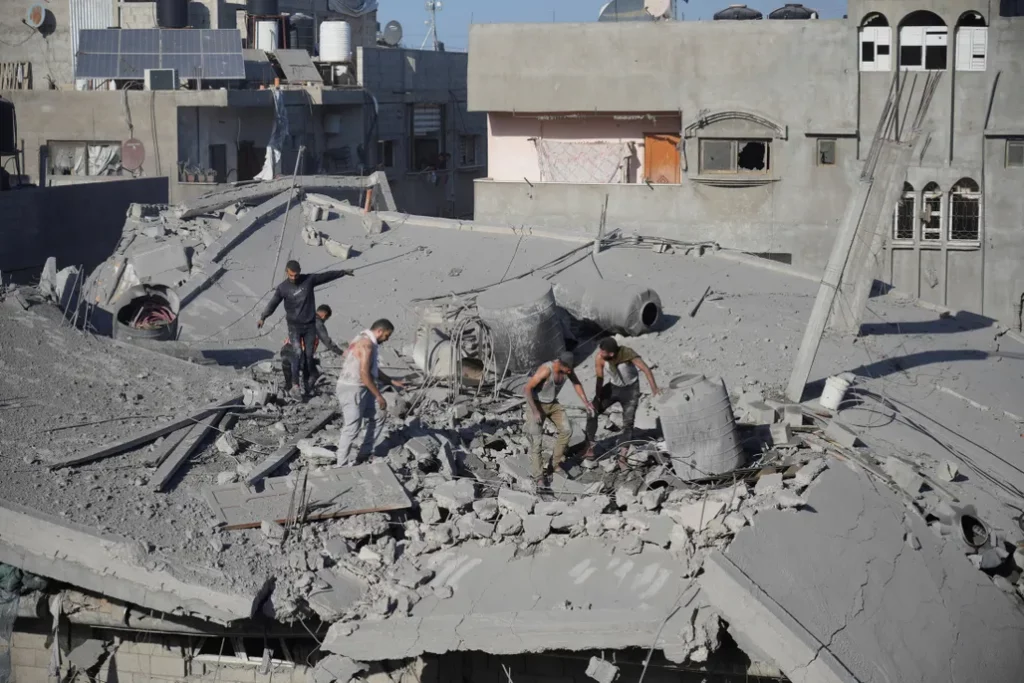
Based on eyewitness accounts, they reported which weapon of destruction shelled or bombed or fired and when exactly, how many were hit, their names and ages, who were civilians and who were armed. They went to the hospitals and checked death certificates and heard from doctors about the types of injuries. Every day, for 18 to 20 hours. Even without talking to them, it’s clear that the task this time is impossible. First, because of the heavier bombing and the unprecedented number of fatalities; and also because of the increased danger to the NGO workers’ lives due to the bombing’s intensity.
One of these NGO researchers, who lives in a supposedly “safe” place – Rafah, in the southern Gaza Strip – texted me on WhatsApp three weeks ago, “We’re good.” In a phone call, he explained what “good” means: he and six other family members were injured by a bomb dropped on a nearby house. In another correspondence, a week ago, when I wrote to him that “good” sounded strange, he replied that it was a word from Muslim and Arab culture. “I say good so you can be calm, feel peace of mind.” And then he explained what we all know: “You can’t describe the situation. There’s no safe place. Not the houses, nor the hospitals, nor the streets, nor the mosques, nor the churches. The danger of bombs and death is everywhere.”
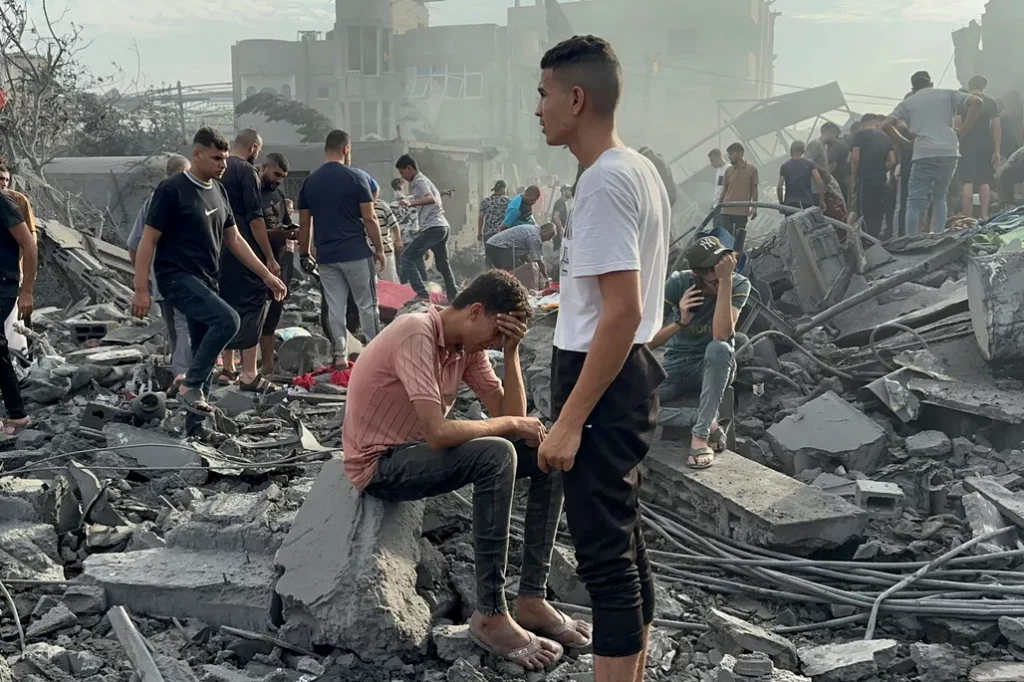
His family comes from the village of Burayr (where Kibbutz Bror Hayil now stands). Another family of friends from the same village, who had lived since 1949 in the Jabaliya refugee camp, has now moved to Rafah: About thirty sisters, brothers, cousins and their children, with a pair of parents about 80 years old, unhealthy and struggling to walk, are all crowded into a relative’s apartment. One of the brothers and his daughter went to buy bread a week ago – that is, to stand in a line for hours near a bakery and hope the flour and fuel wouldn’t run out before their turn. A bomb was dropped nearby, sending concrete fragments flying. They were both extracted from under a fragment: the brother with a broken hand, the daughter with a broken pelvic bone. They had to wait five days for surgery.
Hassan, one of the siblings, a science professor, was naturalized in the European country where he studied. On Friday, he and his wife and children were among the foreign nationals whom Israel and Egypt had allowed to leave Gaza – about 1,047 so far. He said to me, “I will never return to the Gaza Strip.” Even with the emotional difficulty of parting from elderly parents, many families consciously decide to split up, between shelters or when heading out for food or water. That way, their fate might be different than that of the families wiped out in the bombings. Heading abroad, therefore, isn’t seen as abandoning family, but rather as a way to keep at least a part of it alive.
